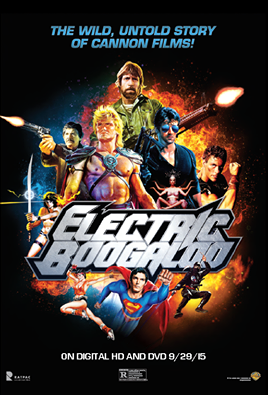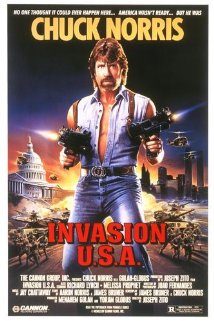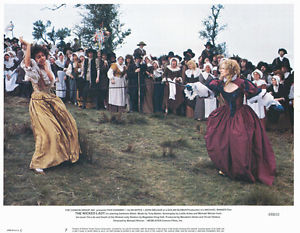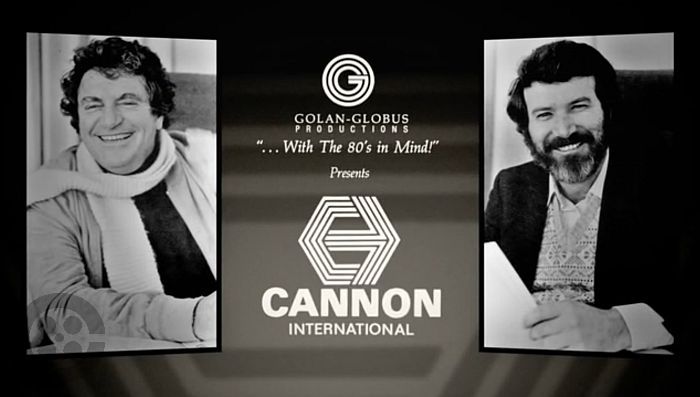Andrew Rostan was a film student before he realized that making comics was his horrible destiny, and he’s never shaken his love of cinema. Every two weeks, he’ll opine on current pictures or important movies from the past.
Australian filmmaker Mark Hartley shot to notice with Not Quite Hollywood, his 2008 doc about his country’s run of over-the-top exploitation movies in their film industry’s nascent stage. Now, working with Warner Bros. and producer Brett Ratner, Hartley has created a hilarious, natural follow-up on an even greater scale about one of the biggest rises and falls in movie history with Electric Boogaloo: The Wild, Untold Story of Cannon Films.
When Two Paunchy Men From Israel Ruled the 80s. (For a Moment.)
 That wild, untold story is one of the great modern American stories in its way, a tale of two immigrants who took an extraordinary gamble. Menahem Golan lived to make movies, becoming the most prolific and financially successful director in Israel. His cousin Yoram Globus was a consummate businessman and deal-maker. The duo purchased Cannon, an undistinguished production company, and spent the 1980s in a large hadron collider of activity, with Globus securing financing through international pre-sales and Golan supervising the movies while directing several.
That wild, untold story is one of the great modern American stories in its way, a tale of two immigrants who took an extraordinary gamble. Menahem Golan lived to make movies, becoming the most prolific and financially successful director in Israel. His cousin Yoram Globus was a consummate businessman and deal-maker. The duo purchased Cannon, an undistinguished production company, and spent the 1980s in a large hadron collider of activity, with Globus securing financing through international pre-sales and Golan supervising the movies while directing several.
Shots of the Cannon offices, a complex in Los Angeles with no decorating frills and piles of Styrofoam take-out boxes, support Golan and Globus’s claim that all they cared about was getting movies made, with every dime going into a non-stop schedule of productions and releases. The atmosphere is matched by Hartley’s direction and the editing and music score by Jamie Blanks (who himself directed the underrated 1998 film Urban Legend, as good as the best Cannon pictures): Electric Boogaloo is a sensory blast of editing worthy of a Michael Bay picture as clips, interviews, and stills build into a remarkable, entertaining montage that still tells a coherent narrative. And around the hilarious anecdotes of shooting 1980s cult classics from The Apple to Breakin’ and the gala opening of Cannon’s offices—a black-tie party held in a parking garage followed by premiering The Delta Force—the film reveals the best and worst sides of the Cannon model. Specifically, how quality didn’t matter as long as the movie got made, but Golan and Globus also let filmmakers do whatever they wanted.
Freedom, Art, and Exploitation
 This stance could and sometimes did result in inventive low-budget filmmaking and a string of films from legendary directors such as Robert Altman, John Cassavetes, and Franco Zeffirelli, who all praised Cannon for non-interference. On the other hand…I earlier referred to Cannon’s story as an American one, and it is not simply in the feel-good narrative of immigrants finding success. Cannon’s business model involved around producing content for an international audience that had an image of American cinema as dominated by sex and violence, and Golan and Globus played right into these expectations. Cannon’s library is dominated by Charles Bronson and Chuck Norris movies, ridiculous ninja pictures, and erotica that the MPAA would threaten to not even rate.
This stance could and sometimes did result in inventive low-budget filmmaking and a string of films from legendary directors such as Robert Altman, John Cassavetes, and Franco Zeffirelli, who all praised Cannon for non-interference. On the other hand…I earlier referred to Cannon’s story as an American one, and it is not simply in the feel-good narrative of immigrants finding success. Cannon’s business model involved around producing content for an international audience that had an image of American cinema as dominated by sex and violence, and Golan and Globus played right into these expectations. Cannon’s library is dominated by Charles Bronson and Chuck Norris movies, ridiculous ninja pictures, and erotica that the MPAA would threaten to not even rate.

Yes, that’s Counselor Troi. And she’s about to lose all her clothing. This was the cleanest picture of this scene I could find.
At times, these tropes intersected in horrid ways. Michael Winner’s Death Wish sequels feature some of the most terrifying rape footage ever depicted, all of it used as an excuse for gratuitous slaughter. (Winner also directed The Wicked Lady, in which Marina Sirtis and Faye Dunaway have a whip fight.) Golan and Globus also remade their breakout Israeli hit Lemon Popsicle as The Last American Virgin (tagline “See it or be it!”), boasting an abortion scene set to U2 music amidst explicit teenage shenanigans. These clips are tough to watch, and I am thankful that Hartley does not shirk from them, and offers a revealing commentary in the process on how the rest of the world sees the United States as purveyors of mindless, titillating entertainment which, perhaps like the country, should not be taken seriously.
For all their faults, Golan and Globus come across as charming rapscallions, which makes their final days both hilarious and poignant. In another highly American act, the duo took a further gamble of overexpansion to meet their dreams of grandeur, financing bigger movies and signing Sylvester Stallone to a deal. However, the hits (Breakin’, Cobra) were eclipsed by the disasters of Sahara (a movie about Brooke Shields in a vintage car race that the cousins swore would be an Oscar contender), Over the Top, Masters of the Universe, and Superman IV. Ultimately, the tone of the many interviewees is that Cannon was doomed, but there was still a kind of memorable magic working there, and that wistful spirit makes Electric Boogaloo a fun watch.
Electric Boogaloo will be released on DVD September 29th. Photos from Facebook, IMDB, Infernal Cinema, and eBay.





I love that Menahem Golan directed an Oscar nominated Israeli movie. Thats like finding out Rolland Emerich had a celebrated career back in Germany. Or that Paul Verhuaven (sp) is one of the most celebrated directors in the Netherlands. Wait, that ones actually true.